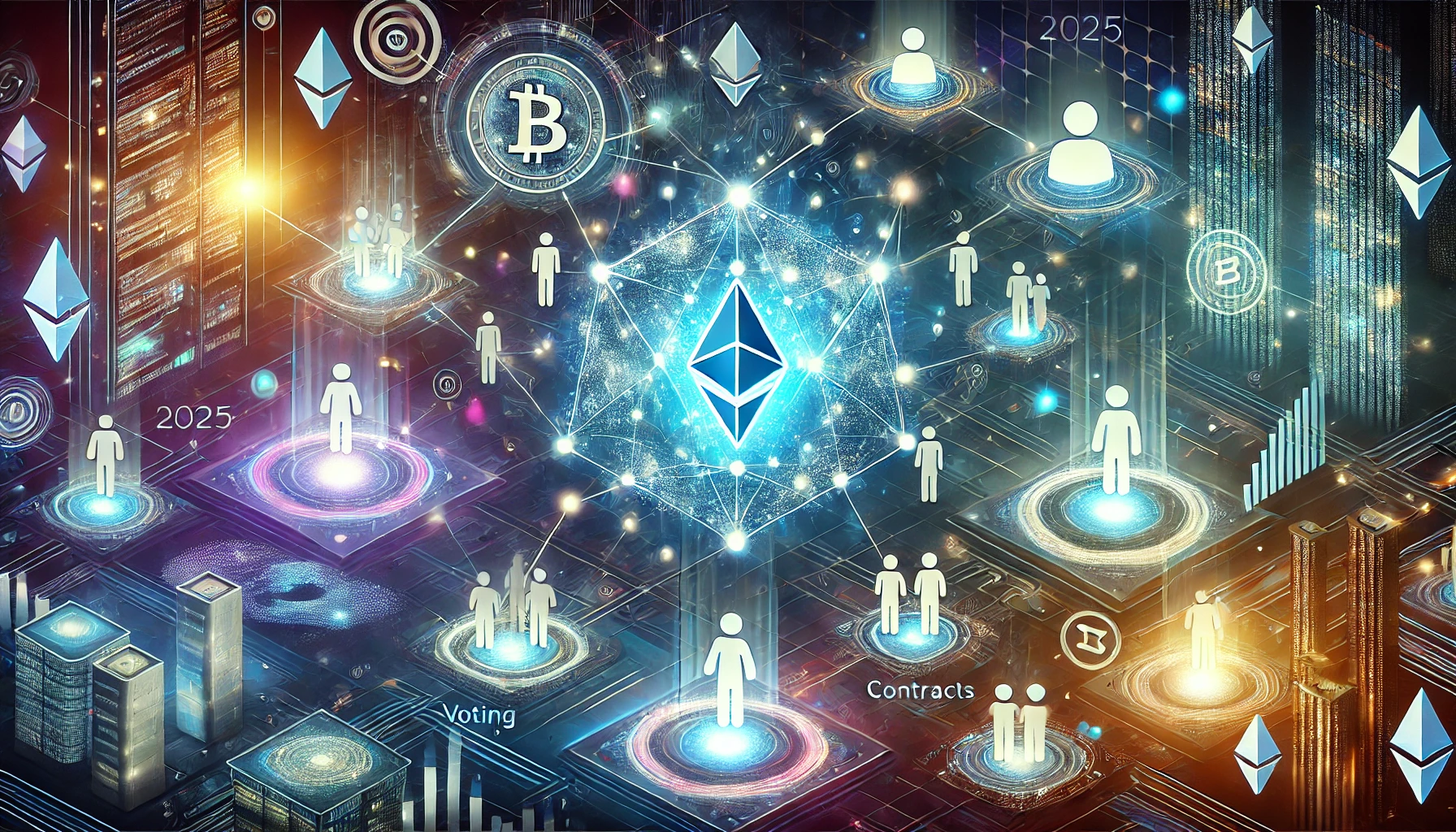
Exploring Decentralized Autonomous Organizations (DAOs) in 2025: The Future of Governance and Collaboration
-

- Sadique
- 2024-12-22 09:35:14
- 15 min Read
Decentralized Autonomous Organizations (DAOs) in 2025
In 2025, the world of governance and collaboration is being reshaped by Decentralized Autonomous Organizations (DAOs). Built on blockchain technology, DAOs enable transparent and democratic decision-making processes without the need for centralized control. This revolutionary concept is empowering individuals and communities to collectively manage resources, implement changes, and achieve shared goals.
In this guide, we delve deep into the world of DAOs, exploring their structure, benefits, challenges, and the immense potential they hold for the future.
What Are Decentralized Autonomous Organizations (DAOs)?
Decentralized Autonomous Organizations, or DAOs, are blockchain-based entities governed by smart contracts and community-driven decision-making. Unlike traditional organizations, DAOs operate without centralized management, allowing stakeholders to participate in key decisions directly.
Key Features of DAOs
- Decentralization: Power is distributed among all members.
- Autonomy: Smart contracts execute pre-defined rules automatically.
- Transparency: Blockchain technology ensures complete visibility of activities.
- Token-Based Voting: Members use tokens to vote on proposals and decisions.
How DAOs Work
DAOs function through a set of predefined rules encoded in smart contracts. Members contribute by holding tokens, which give them voting rights. These votes shape the decisions, from fund allocation to strategic direction.
Benefits of DAOs in 2025
Enhanced Transparency
All transactions and decisions are recorded on the blockchain, ensuring complete transparency.
Global Accessibility
DAOs are accessible to anyone with an internet connection, breaking geographical barriers.
Reduced Bureaucracy
Smart contracts automate processes, eliminating the need for intermediaries and reducing overhead costs.
Community Empowerment
DAOs empower individuals to have a direct say in organizational decisions, fostering a sense of ownership.
Use Cases of DAOs in 2025
Governance and Decision-Making
DAOs are used for managing communities, allocating resources, and implementing changes collectively.
Crowdfunding
Platforms like MakerDAO enable fundraising and financial management transparently.
Decentralized Finance (DeFi)
DAOs play a significant role in managing DeFi protocols, ensuring democratic control over financial products.
Creative Collaborations
Artists and creators use DAOs to fund and manage projects, splitting profits fairly among contributors.
Challenges Facing DAOs
Scalability Issues
As DAOs grow, managing a large number of members becomes challenging.
Security Concerns
Smart contract vulnerabilities can lead to significant losses, as seen in high-profile DAO hacks.
Legal Uncertainty
The regulatory framework for DAOs is still evolving, creating ambiguities around their legal status.
Decision-Making Delays
Democratic voting can sometimes lead to slower decision-making processes compared to centralized organizations.
The Future of DAOs in 2025 and Beyond
Integration with AI and IoT
Combining DAOs with AI and IoT could enhance their efficiency and adaptability.
Cross-Chain Interoperability
Interoperable blockchains will allow DAOs to operate seamlessly across multiple platforms.
Wider Adoption
As awareness and regulatory clarity increase, DAOs will become a standard model for organizations.
Evolving Governance Models
New models will emerge, balancing efficiency with inclusivity to address current challenges.
Getting Started with DAOs
Joining a DAO
Identify a DAO aligned with your interests and acquire its governance tokens to participate.
Creating Your DAO
- Define the purpose and rules.
- Deploy smart contracts on a blockchain.
- Launch and onboard members.
Tools and Platforms for DAOs
- Aragon: For creating and managing DAOs.
- DAOstack: A platform for scalable and collaborative decision-making.
- Gnosis Safe: For secure multi-signature wallet management.
FAQs
Q1: What is a DAO, and how does it work?
A Decentralized Autonomous Organization (DAO) is a blockchain-based entity that operates through smart contracts. Members vote on decisions, and smart contracts execute them transparently.
Q2: What are the benefits of joining a DAO?
DAOs offer transparency, community empowerment, and reduced bureaucracy, allowing members to have a direct say in decisions.
Q3: Are DAOs legal?
The legal status of DAOs varies by jurisdiction. Some countries recognize them as legitimate entities, while others are still developing regulations.
Q4: How do DAOs generate revenue?
DAOs can generate revenue through various means, such as transaction fees, investments, or selling governance tokens.
Q5: What are the risks of participating in a DAO?
Risks include smart contract vulnerabilities, regulatory uncertainties, and potential decision-making inefficiencies.
Latest Posts
-
2024-12-29 06:41:35
-
How Decentralized Finance (DeFi) is Disrupting Traditional Banking in 2025
2024-12-22 08:56:45




